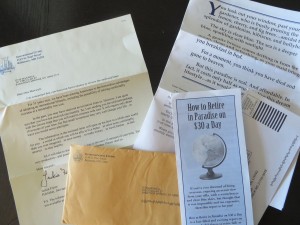
The lift note, or publisher’s letter, is an additional element in a direct mail package which is designed to elevate (lift) the response rate and profitability sufficiently to repay its printing and production costs. It might highlight the offer, answer one specific objection, spotlight a key benefit, or emphasize the penalty for not responding.
The pub letter is a variation which is literally a communication from the publisher. The conceit is that he (in the old days, always a male) grabbed the mailer proofs as they were on their way to the printer and was inspired to add a personal message. He might talk about his pride in the product, make a guarantee, or offer the classic “frankly, I’m puzzled” perspective in which he wonders why more people don’t respond to such a great opportunity and urges the reader not to lose out.
We don’t see too many lift notes in today’s lean direct mail packs, but I received a fine example recently from International Living. These folks are one of the last old-school newsletter publishers and they send a classic 8-page letter about the low costs and lifestyle benefits to be found retiring abroad.
The pub note, which is personalized and the first thing you see upon opening the package, begins: “I’m concerned that you have not had a chance to review the enclosed letter”. The publisher (now it’s a she) drops in a paragraph describing the product then continues, “in the past, you may have received an invitation from us. However, I’m quite sure you have not received one recently…” and then goes on to sell not the newsletter, but the investment of 10 minutes of my time to read the rest of the package components.
What’s nice about this is that the copywriter took the knowledge that the name was rented from a list of people who have not been prospected previously, and turned this into a very personal message and benefit. (Reminds me of the classic Emily Soell letter for Vanity Fair which begins “if the list on which I found your name is any indication…”)
Does it work? I sure hope so. In essence, by elevating and personalizing the lift note, International Living has turned it into the driver of the package. The preprinted long form letter, which today’s distracted readers are less likely to pay attention to, becomes a supporting brochure. It’s a great way to refresh an appeal to an older audience which today is far more cynical and less trusting than the previous generation. I’m definitely going to try this tactic for myself, next time I have the budget to write a package with lots of components. How about you?